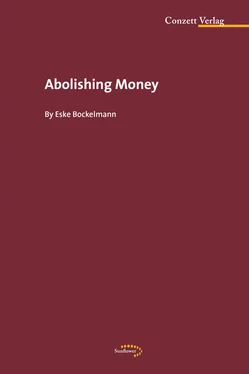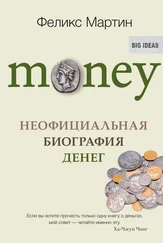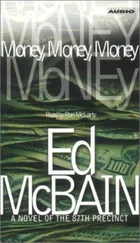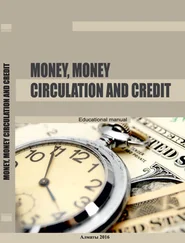Abolishing Money
By Eske Bockelmann
All rights reserved
Any form of reprint as well as the reproduction in television, radio, film, sound or picture storage media and the storage and dissemination in electronic media or use for talks, including extracts, are only permissible with formal written approval of the publisher.
1 stedition 2012
© Conzett Verlag by Sunflower Foundation
(as a print edition issued by: MoneyMuseum by Sunflower Foundation)
Verena-Conzett-Strasse 7
PO Box
CH-8036 Zürich
Translated by Roy Greenspan
Cover by Sergeant AG, Zürich
As a print edition available for free at
MoneyMuseum
Hadlaubstrasse 106
CH-8006 Zürich
Phone: +41 44 350 73 80, Bureau: +41 44 242 76 54
ISBN 978-3-03760-017-7
For further information, please go to
www.moneymuseum.com
and to the Media page of
www.sunflower.ch
eBook-Herstellung und Auslieferung:
Brockhaus Commission, Kornwestheim
www.brocom.de
Content
Prologue Prologue When I realized, as a five-year-old, that like everyone else, I too would one day have to earn my own money, I was grimly certain, firstly, that I would fail and, secondly, that I really had to learn magic. Otherwise, it was painfully clear to me, that I would never manage to achieve all those things essential for life. I could well imagine acquiring a profession and mastering various skills that I did not yet have. What I did find threatening however, was the fact that my profession would be invariably linked to the apportioning of that strange and alien material which seemed to come from an outside source and to which obviously, my parents and their professions were subject. Moreover the fact that my own very survival would depend on this substance left me no alternative but to resort to magic. Of course, I realized my prospects of learning magic were rather poor but since my intentions were only to secure the basics like food and shelter, if I would just limit myself to conjuring these necessities and not everything right away... To this day, I have not learned any magic. And so I raised my hand when the question was finally asked, “... or would anyone want to abolish money?” It was during the closing session of a conference on the sociologist Alfred Sohn-Rethel. I was participating in a roundtable discussion on the podium and Jochen Hörisch was summing up: Despite sharply criticizing money and commerce, Sohn-Rethel was nonetheless an admirer of money. Thus, we should not conclude our conference by totally disparaging money but rather by recognizing its considerable achievements. After all, money facilitates society’s supply and production mechanisms, and, according to Sohn-Rethel, ultimately created rational thought itself. Our very language itself has been enriched by the sheer inexhaustible resource of metaphors pertaining to money. Indeed money deserves our admiration, a fact we should acknowledge, “... or would anyone want to abolish money?” Well, I raised my hand: If it were up to me, I would. But wait a minute. I looked around the hall and saw no other hands in the air; mine was the only one. No one else, it seemed, cherished the wish or even the thought that one day things could work out without money. Astounded, I wondered then whether Sohn-Rethel’s insights were less about encouraging the wish to abolish money and more about explaining why no one actually wants to do so.
1. Things are not going well with money
2. Two ways to improve the world “with”
3. The mind doesn’t think “without”
4. Value as energy
5. The unthinkable thought
When I realized, as a five-year-old, that like everyone else, I too would one day have to earn my own money, I was grimly certain, firstly, that I would fail and, secondly, that I really had to learn magic. Otherwise, it was painfully clear to me, that I would never manage to achieve all those things essential for life.
I could well imagine acquiring a profession and mastering various skills that I did not yet have. What I did find threatening however, was the fact that my profession would be invariably linked to the apportioning of that strange and alien material which seemed to come from an outside source and to which obviously, my parents and their professions were subject. Moreover the fact that my own very survival would depend on this substance left me no alternative but to resort to magic. Of course, I realized my prospects of learning magic were rather poor but since my intentions were only to secure the basics like food and shelter, if I would just limit myself to conjuring these necessities and not everything right away...
To this day, I have not learned any magic. And so I raised my hand when the question was finally asked, “... or would anyone want to abolish money?” It was during the closing session of a conference on the sociologist Alfred Sohn-Rethel. I was participating in a roundtable discussion on the podium and Jochen Hörisch was summing up: Despite sharply criticizing money and commerce, Sohn-Rethel was nonetheless an admirer of money. Thus, we should not conclude our conference by totally disparaging money but rather by recognizing its considerable achievements. After all, money facilitates society’s supply and production mechanisms, and, according to Sohn-Rethel, ultimately created rational thought itself. Our very language itself has been enriched by the sheer inexhaustible resource of metaphors pertaining to money. Indeed money deserves our admiration, a fact we should acknowledge, “... or would anyone want to abolish money?”
Well, I raised my hand: If it were up to me, I would. But wait a minute. I looked around the hall and saw no other hands in the air; mine was the only one. No one else, it seemed, cherished the wish or even the thought that one day things could work out without money. Astounded, I wondered then whether Sohn-Rethel’s insights were less about encouraging the wish to abolish money and more about explaining why no one actually wants to do so.
1. Things are not going well with money
Are things really working out with money? No, things are not going well with it. The most that can be said in this respect, is in fact that money enables one very small part of humanity to become rich and prosperous, whereas the greater part by far is, as a result of this wealth, subjected to torment, deprivation and famine. Is money to blame? Yes it is money’s fault, namely, in as far as money is the very first and most common foundation of exactly those social conditions that are in force today worldwide; money has caused this kind of division of humanity and exacerbated the plight of the ever-growing majority of the world’s population.
This should not be interpreted as if, before the age of money, there was no poverty, suffering or violence. And there is yet another misconception to be avoided, one that Sohn-Rethel long cultivated, namely that with the minting of the first coins early in Greek antiquity, money already formed the nexus rerum —in other words, that money already then had the power to support society entirely and produce the effects I’ve referred to. That stage was not reached until Europe entered the post-medieval period. Indeed, the transition to a money-based economy emerged in the course of the so-called “long” 16 thcentury, and it is this transition that truly marks the beginning of the modern era. Of course, money existed prior to 1500, but before that time—and much later outside of Europe—goods were mainly produced for personal use. This meant the necessities of society were not, for the most part, produced as merchandise to be then sold for money. Rather, they were produced by those who also used them directly, or they were appropriated by those who, thanks to established lines of power and by decree, then distributed them to their dependents. As long as the entire life cycle of a society rested on these principles and that was until the feudal Middle Ages, it was not dominated by the production of merchandise and exchange values. And consequently, not by money. Only later, with Europe’s transition to the so-defined modern era, did money begin to penetrate all of society, and to decisively make the sustenance of the people and their relations with one another dependent on it . This is the origin of the historically very specific social conditions that I am referring to and which are becoming obvious today. And despite wealth and unimaginable gains in productivity, all is not going well with money.
Читать дальше












